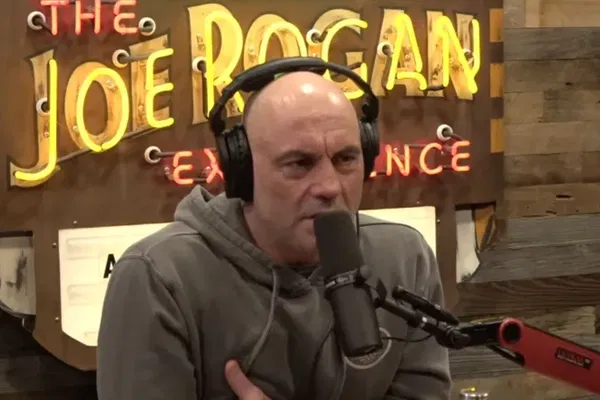

Joe Rogan knows how to stir the pot, and during his recent podcast episode with Ilia Topuria on JRE MMA Show #166, he did so. The conversation took an unexpected turn when the UFC commentator hinted at a major loophole in the UFC’s anti-doping system, which may impact how fighters approach training camps. Without mentioning names, he implied that not all fighters are held to the same standard and that some may have a hidden advantage. What’s the implication? Where you train could determine how often you get tested.
Rogan highlighted a clear gap between American fighters and those who train overseas. “If you are in America and you live in Arizona, they’ll visit you all the time. They’ll test you a bunch, you know. And there are some people that have been tested a bunch—they get tested a lot,” he stated, referring to the frequency with which fighters in the United States are tested by the new UFC Anti-Doping Agency. The reach of these tests is wide, but not always equal. According to the JRE host, athletes in America are subjected to constant monitoring, with limited ability to bend the rules.
This changes, however, when fighters base themselves in remote areas such as Dagestan or Thailand. Joe Rogan explained that logistical constraints frequently prohibit testers from arriving unexpectedly in these difficult-to-access places. “And then there are some people that don’t get tested as much. And if you’re going to go and do your camp in Thailand or you’re going to go do your camp in Dagestan, it’s a lot more difficult for them to get to you and test you randomly,” Rogan added. Such an arrangement allows for less oversight and, potentially, less accountability for individuals training outside the United States.
ADVERTISEMENT
Article continues below this ad

via Imago
Bildnummer: 11010800 Datum: 20.07.2012 Copyright: imago/ZUMA Press
July 20, 2012 – Calgary, Alberta, Canada – JOE ROGAN hosts the UFC 149 weigh in at Scotiabank Saddledome on July 20, 2012 in Calgary, Alberta, Canada UFC 2012 – Faber vs Barao Weigh Ins PUBLICATIONxINxGERxSUIxAUTxONLY – ZUMAl10; Kampfsport Pressetermin Wiegetermin UFC Ultimate Fighting MMA Mixed Martial Arts xdp x0x 2012 hoch
Image number 11010800 date 20 07 2012 Copyright imago Zuma Press July 20 2012 Calgary Alberta Canada Joe Rogan Hosts The UFC 149 Weigh in AT Scotiabank Saddledome ON July 20 2012 in Calgary Alberta Canada UFC 2012 Faber vs Weigh ins PUBLICATIONxINxGERxSUIxAUTxONLY Martial arts Press call Weighing date UFC Ultimate Fighting MMA Mixed Martial Arts x0x 2012 vertical
While the UFC’s revamped anti-doping program was implemented to assure fairness after parting ways with USADA, Joe Rogan’s comments hint that loopholes still remain. The fight for clean sport is dependent on equal enforcement, but if geography influences testing frequency, that balance is lost. With competitors’ reputations and futures on the line, this revelation may revive debate over how truly fair the UFC playing field is.
However, till Dana White takes some action, the advantage remains. But Rogan makes sure to address this issue time and again, like he did in the past on yet another episode of the Joe Rogan Experience MMA show.
ADVERTISEMENT
Article continues below this ad
Back when Joe Rogan exposed Dagestan’s advantage amid drug accusations surrounding fighters
Over the past few years, Joe Rogan has expressed several issues about the unevenness of UFC’s drug testing. It’s a subject he’s returned to time and again, including in a 2024 episode of the JRE MMA Show featuring Jorge Masvidal. That discussion delved deeper into the gap between fighters based in the United States and those trained abroad, particularly in isolated locations such as Dagestan.
Masvidal revealed that he has undergone approximately twenty drug tests in a single year. In contrast, overseas fighters, particularly those located far from USADA’s direct monitoring, appeared to fall through the cracks. So, as expected, the JRE host did not hesitate to support ‘Gamebred,’ noting that anti-doping officials were not exactly keen to go into the Caucasus Mountains for a surprise test.
What’s your perspective on:
Are overseas fighters getting an unfair advantage due to lax testing? What's your take?
Have an interesting take?
This was not just assumption or guesswork. By the time Rogan and Masvidal aired their objections, history had already provided a compelling case study: Usman Nurmagomedov. Despite not being a UFC fighter, this situation broke the belief that Dagestani fighters are the most disciplined bunch out there who would never juice themselves up. The Bellator lightweight champion tested positive for a banned substance after his Grand Prix semi-final match in November 2023.
ADVERTISEMENT
Article continues below this ad
The consequences were severe, including a six-month suspension, a $50,000 fine, and disqualification from the million-dollar finals. Though he was able to maintain his title, the cost was high. And, while Usman’s error was finally discovered, it sparked unsettling questions: what about those that aren’t?
It’s a difficult decision for both fans and fighters. On the surface, Dagestani fighters such as Usman and his cousin Khabib Nurmagomedov are praised for their work ethic, discipline, and dominance. Their quiet, courteous nature makes it difficult to picture them breaking the rules. But, as Joe Rogan often emphasizes, this isn’t necessarily about people cheating. It’s about system failure. When enforcement is inconsistent and certain areas become difficult to reach, it throws doubt on even the most respected names. And those shadows don’t fade easily. What do you think? What steps can the UFC take to fix the loophole? Let us know in the comments.
ADVERTISEMENT
ADVERTISEMENT
ADVERTISEMENT
ADVERTISEMENT


"Are overseas fighters getting an unfair advantage due to lax testing? What's your take?"